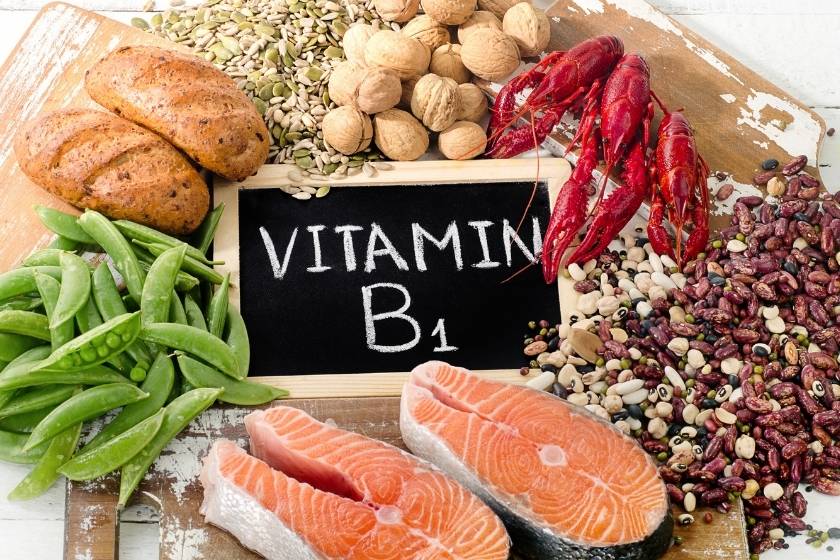Vitamins are organic compounds that are vital for maintaining a healthy life, requiring external intake for our bodies to function efficiently and effectively. Among these essential nutrients, Vitamin B1, also known as thiamine, plays a crucial role in our health. But what exactly is Vitamin B1, what does it do, and how do deficiencies manifest? This blog post will provide a comprehensive overview of Vitamin B1, from its benefits and potential harms to its dietary sources and intake methods.
What is Vitamin B1 and What Does it Do?
Vitamin B1, or thiamine, is pivotal in converting carbohydrates into energy and supporting the health of the nervous system. As a water-soluble vitamin, thiamine cannot be stored by the body, necessitating regular consumption. This characteristic underscores the importance of Vitamin B1 for our well-being.
Functions and Role of Vitamin B1 in the Body
Vitamin B1 serves several crucial functions in the body:
- Energy Production: It plays a role in metabolizing carbohydrates to produce energy, keeping us active and vigorous.
- Nervous System Health: Thiamine is essential for nerve transmission, ensuring the proper functioning of the nervous system and preserving neurological health.
- Heart Health: Necessary for the smooth operation of the heart muscle, it helps maintain heart health and prevent heart diseases.
- Psychological Function: It is effective in regulating brain functions, safeguarding psychological health, and stabilizing our mood.
Vitamin B1 Deficiency and Its Symptoms: What Should We Do?
Deficiency in Vitamin B1 can arise due to various health issues and dietary insufficiencies, manifesting through symptoms such as:
- Fatigue: A general feeling of weakness and lack of energy, indicating the body’s unmet energy needs.
- Poor Memory: Forgetfulness and difficulty concentrating, signaling impaired brain functions.
- Nervous System Problems: Tingling, numbness, and sometimes pain, suggesting an unhealthy nervous system.
- Muscle Weakness: Loss of strength in arms and legs, indicating improperly functioning muscles.
- Beriberi Disease: A severe deficiency can lead to nerve and heart problems.
Benefits of Vitamin B1 and Its Contributions to Our Health
Vitamin B1 boasts numerous benefits:
- Metabolism Regulation: Optimizes the body’s energy production, meeting energy needs and keeping us vigorous.
- Neurological Health: Supports neurological functions by maintaining nerve cell health, ensuring a healthy nervous system, and preventing neurological diseases.
- Emotional Balance: Has positive effects on mental health, protecting psychological well-being and regulating mood.
Harms of Excessive Vitamin B1 Intake: What Should We Do?
As a water-soluble vitamin, excess Vitamin B1 is usually expelled through urine, making toxicity rare. However, very high doses can cause side effects in some individuals. While oral intake of Vitamin B1 is generally safe, excessive consumption or high-dose supplements may lead to:
- Allergic Reactions: In rare cases, high doses can cause itching, redness, or hives.
- Nervous System Effects: Excessively high doses may adversely affect the nervous system, though such cases are very rare.
- Gastrointestinal Issues: High doses can cause nausea, vomiting, and diarrhea in some individuals.
Vitamin B1 Sources: Where to Find It
Vitamin B1 (Thiamine) plays a vital role in energy conversion from carbohydrates and is essential for the nervous system, muscles, and heart. Sources of Vitamin B1 include:
- Whole Grains
- Brown Rice
- Barley
- Bulgur
- Whole Grain Breads
- Whole Grain Pastas
- Nuts and Seeds
- Sunflower Seeds
- Pine Nuts
- Almonds
- Hazelnuts
- Meat and Meat Products
- Beef
- Liver (beef, chicken, etc.)
- Other offal
- Legumes
- Lentils
- Beans (black beans, lima beans, etc.)
- Chickpeas
- Peas
- Vegetables
- Spinach
- Asparagus
- Brussels Sprouts
- Green Leafy Vegetables
- Fish
- Salmon
- Trout
- Tuna
- Whole Grain Breads and Cereals
- Whole grain breads
- Breakfast whole grain cereals
- Dairy Products
- Milk (in small amounts)
- Yogurt (in small amounts)
- Cheese (in small amounts)
This list includes various nutrient-rich food sources of Vitamin B1. A healthy and balanced diet incorporating these foods regularly can help meet the body’s Vitamin B1 needs.
Since Vitamin B1 is water-soluble and not stored in the body, it needs to be regularly consumed. A healthy and balanced diet usually suffices in meeting the Vitamin B1 requirements.
While Vitamin B1 is crucial for our health, a balanced diet and, if necessary, doctor-advised supplements can meet the body’s needs.
Consulting a healthcare professional upon noticing any deficiency symptoms is the best approach. This ensures the preservation of our health and maximizes the benefits of Vitamin B1.

